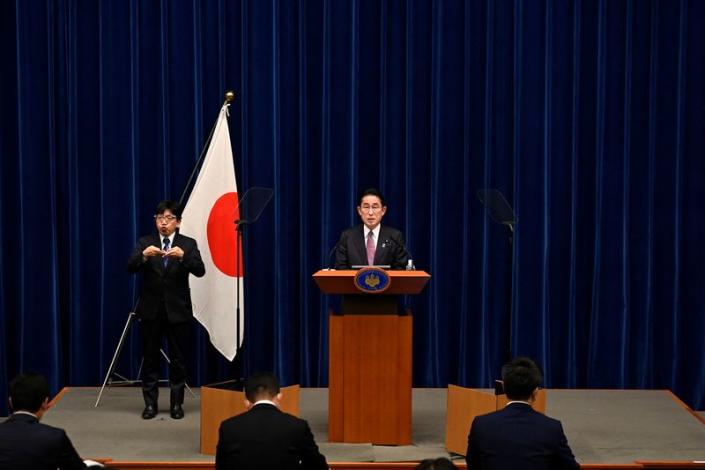Japan plans to double its spending on defence to 2% of gross domestic product (GDP) to fund its biggest military build-up since World War Two.
Prime Minister Kishida Fumio announced a five-year plan on Friday to prepare the country’s armed forces for conflict, as regional tensions rise and Russia’s invasion of Ukraine stokes fears of war.
Kishida said his country was at a “turning point in history” and the $320-billion plan he unveiled, involving the purchase of long-range missiles capable of hitting China, was “my answer to the various security challenges that we face.”
His government worries that Russia has set a precedent that will encourage China to attack Taiwan, threatening nearby Japanese islands, disrupting supplies of advanced semiconductors and putting a potential stranglehold on sea lanes that supply oil from the Middle East.
“This is setting a new heading for Japan. If appropriately executed, the Self-Defence Forces will be a real, world-class effective force,” said Yoji Koda, a former Maritime Self Defence Force admiral, who commanded the Japanese fleet in 2008.
ALSO SEE:
US Blacklists China Firms in AI Chip Sector, Russia Suppliers
Japan Sheds Pacifist Outlook
In the sweeping five-year plan – once-unthinkable in pacifist Japan – the government said it would also stockpile spare parts and other munitions, expand transport capacity and develop cyber warfare capabilities.
In its postwar, American-authored constitution, Japan gave up the right to wage war and means to do so.
“Russia’s invasion of Ukraine is a serious violation of laws that forbid the use of force and has shaken the foundations of the international order,” the strategy paper said.
“The strategic challenge posed by China is the biggest Japan has ever faced,” it added, also noting that Beijing had not ruled out using force to bring Taiwan under its control.
Defence Cooperation with Taiwan
A separate national security strategy document that pointed to China, Russia and North Korea, promised close cooperation with the United States and other like-minded nations to deter threats to the established international order.
“The Prime Minister is making a clear, unambiguous strategic statement about Japan’s role as a security provider in the Indo-Pacific,” US Ambassador to Japan Rahm Emanuel said in a statement. “He has put a capital “D” next to Japan’s deterrence,” he added.
Meeting Japan-Taiwan Exchange Association chairman Mitsuo Ohashi in Taipei on Friday, Taiwan President Tsai Ing-wen said she expected greater defence cooperation with Japan.
“We look forward to Taiwan and Japan continuing to create new cooperation achievements in various fields such as national defence and security, the economy, trade, and industrial transformation,” the presidential office cited Tsai as saying.
China’s foreign ministry did not immediately respond to a request for comment.
Lesson From Ukraine
“The Ukraine war has shown us the necessity of being able to sustain a fight, and that is something Japan has not so far been prepared for,” said Toshimichi Nagaiwa, a retired Air Self-Defence Force general. “Japan is making a late start, it is like we are 200 metres behind in a 400-metre sprint,” he added.
China defence spending overtook Japan’s at the turn of the century, and now has a military budget more than four times larger. Too few munitions and a lack of spare parts that ground planes and put other military equipment out of action are the most immediate problems for Japan to tackle, military sources have said.
Kishida’s plan will double defence outlays to about 2% of GDP over five years, blowing past a self-imposed 1% spending limit that has been in place since 1976.
It will increase the defence ministry’s budget to around a tenth of all public spending at current levels, and will make Japan the world’s third-biggest military spender after the United States and China, based on current budgets.
That splurge will provide work for Japanese military equipment makers such as Mitsubishi Heavy Industries (MHI), which is expected to lead development of three of the longer-range missiles that will be part of Japan’s new missile force.
Jet Fighter Project with Britain, Italy
MHI will also build Japan’s next jet fighter alongside BAE Systems PLC and Leonardo SPA in a joint project between Japan, Britain and Italy announced last week. Tokyo allocated $5.6 billion for that in the five-year defence programme.
Foreign companies will also benefit. Japan says it wants ship-launched US Tomahawk cruise missiles made by Raytheon Technologies to be part of its new deterrent force.
Other items on Japan’s military shopping list over the next five years include interceptor missiles for ballistic missile defence, attack and reconnaissance drones, satellite communications equipment, Lockheed Martin F-35 stealth fighters, helicopters, submarines, warships and heavy-lift transport jets.
To pay for that equipment, Kishida’s ruling bloc said earlier on Friday it would raise tobacco, corporate and disaster-reconstruction income taxes. But, with opposition to tax hikes within his ruling Liberal Democratic party still strong, the Japanese leader has yet to say when he will implement those higher rates.
- Reuters with additional editing by Jim Pollard
ALSO SEE:
Japan May Ease Military Export Rules Amid Defence Revamp
Japan Plans Major Arms Buildup as China Eyes Taiwan Takeover
Japan May Hike Corporate, Income Tax to Fund Military Boost
US, Taiwan in Talks Over Joint Weapons Production: Nikkei
US Slams ‘Reckless’ North Korean Missile That Caused Japan Alert
Japan, Philippines Agree to Bolster Defence Cooperation
























